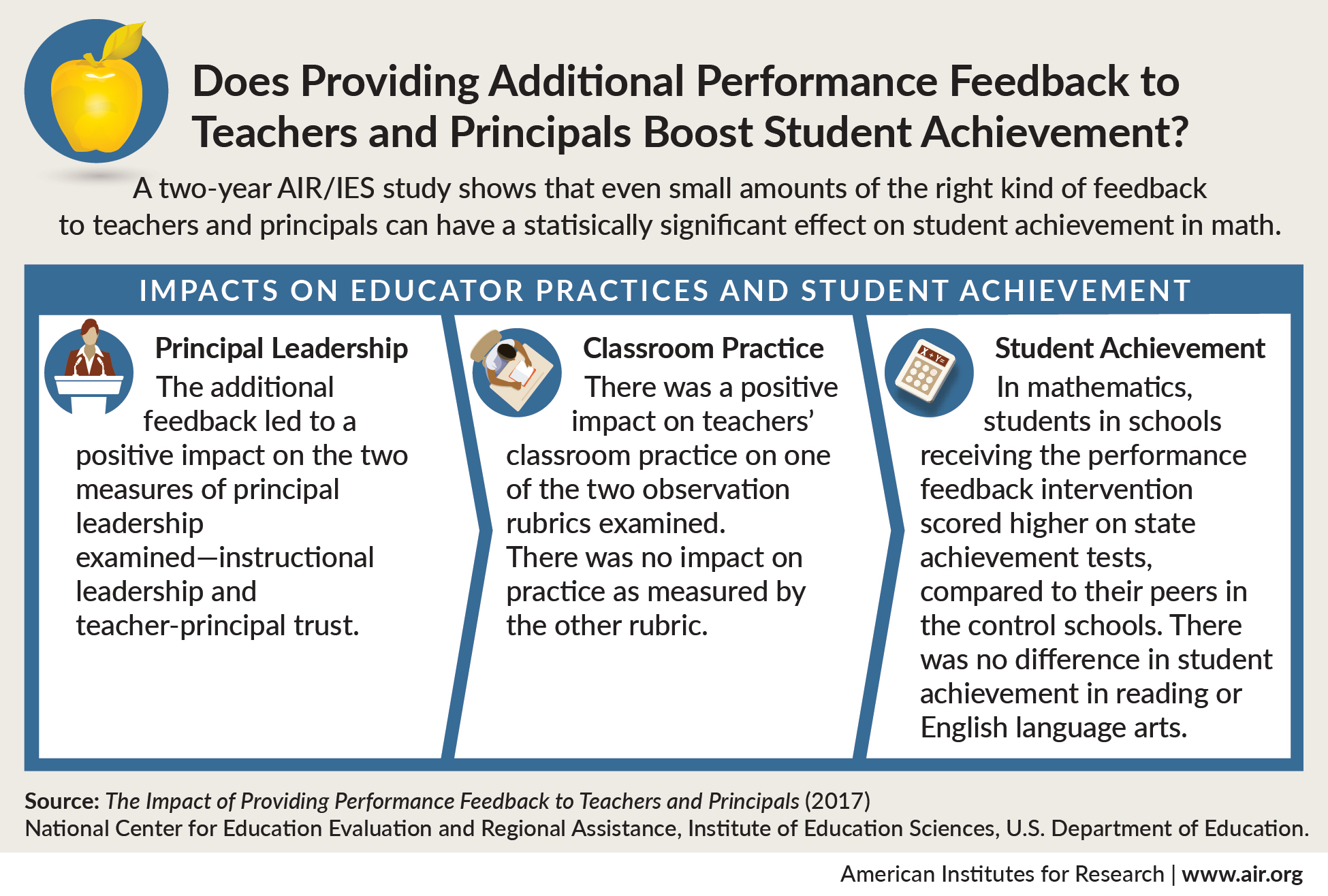American Institutes for Research Study Examines the Effect of Providing Educators with Additional Performance Feedback
Washington, D.C. – Providing educators with additional feedback on their performance had a positive effect on student achievement in mathematics, but no statistically significant effect on reading/English language arts, finds a new study report examining the effects and implementation of a two-year intervention led by the American Institutes for Research (AIR) on behalf of the U.S. Department of Education’s Institute of Education Sciences (IES).
Educator performance evaluation systems are a potential tool for improving student achievement by increasing the effectiveness of the educator workforce. Emerging research suggests that providing more frequent, specific feedback on classroom practice may lead to improvements in teacher performance and student achievement. The study tested the hypothesis that providing performance feedback would improve teachers’ classroom practice and principals’ leadership and, ultimately, student achievement.

As part of the study, a group of elementary and middle schools in eight participating districts across five states were provided resources and support to implement three performance measures—classroom practice, student growth, and principal leadership—during the 2012–13 and 2013–14 school years. Within each district, schools were randomly assigned either to implement or not implement the performance measures. The measures were used to provide educators and their supervisors with information on their performance, but no formal “stakes” were attached to the feedback; for example, the results were not used by the study districts for staffing decisions.
“The information gleaned from these performance measures may help to identify educators who need support and indicate areas for improvement, leading to improved classroom practice and leadership and boosting student achievement,” said Mike Garet, AIR vice president and institute fellow, and the study’s principal investigator.
Findings on the study’s effect on teachers’ classroom practice, principal leadership, and student achievement include the following:
- In Year 1, the intervention had a positive effect on students’ achievement in mathematics, amounting to about four weeks of learning. In Year 2, the effect on mathematics achievement was similar in magnitude but not statistically significant. The intervention did not have a statistically significant effect on reading/English language arts achievement in either year.
- The intervention had a positive effect on teachers’ classroom practice on one of the two observation rubrics used to provide feedback, moving teachers from the 50th to the 57th percentile, but it had no effect on practice as measured by the other rubric.
- The intervention also had a positive effect on the two measures of principal leadership examined—instructional leadership and teacher-principal trust—moving teachers from the 50th to the 60th percentile on teacher-principal trust in Year 1, for example.
- The study’s measures provided some information to identify educators who needed support, but provided limited information to indicate the areas of practice educators most needed to improve.
“It was surprising to find an effect on student mathematics performance in Year 1 given how little time it takes for those teachers to receive performance feedback,” commented Andrew Wayne, AIR managing researcher and the project’s director. “However, we do not know if the effects were driven by one, two, or all three types of feedback given to educators.”
This is the second and final report based on a study that IES conducted on the implementation of teacher and principal performance measures highlighted by recent research, as well as the effect of providing feedback based on these measures.
The study’s first report, Early Implementation Findings From a Study of Teacher and Principal Performance Measurement and Feedback, focused on the first year of implementation and described the characteristics of the educator performance measures and teachers’ and principals’ experiences with feedback. It was one of the few detailed descriptions of educator performance measures implemented on a large scale in districts.
Explore the report, The Impact of Providing Performance Feedback to Teachers and Principals, and accompanying blog at www.air.org.
About AIR
Established in 1946, with headquarters in Washington, D.C., the American Institutes for Research (AIR) is a nonpartisan, not-for-profit organization that conducts behavioral and social science research and delivers technical assistance both domestically and internationally in the areas of health, education, and workforce productivity. For more information, visit www.air.org.
###